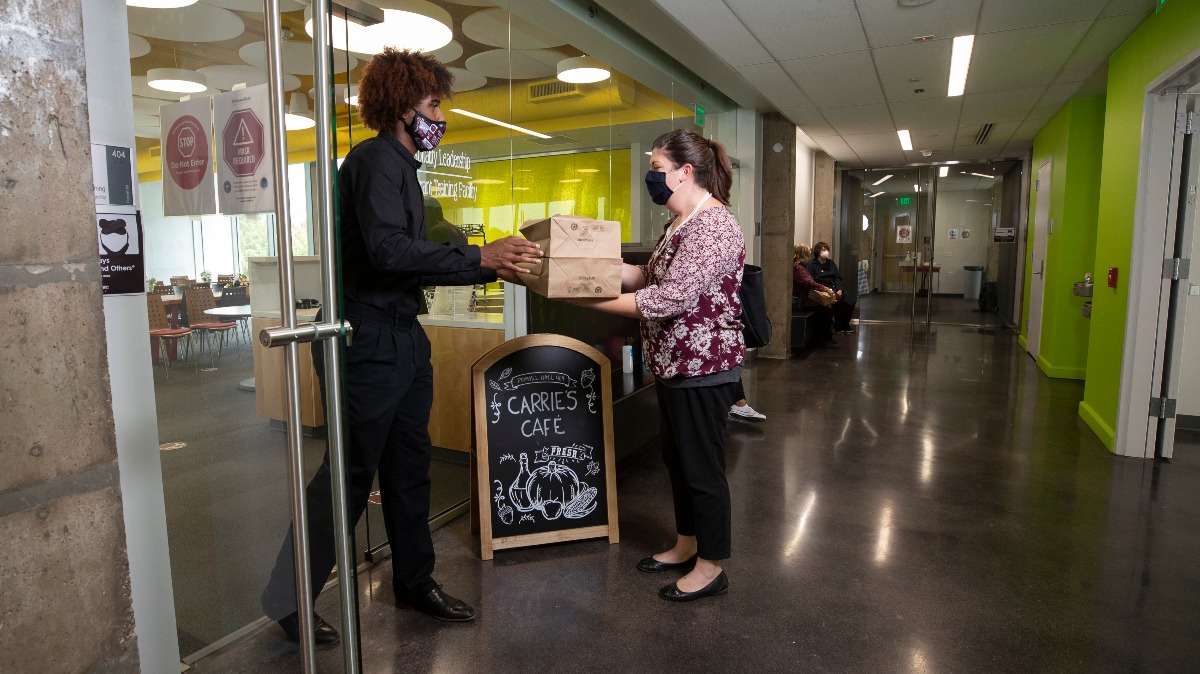Concerns of COVID-19 have changed how the world operates.
The hospitality industry is among those most impacted by these changes.
Professors in the department of hospitality leadership at Missouri State University have adjusted their curriculum. The adjustments serve to prepare students for the industry’s new ways of doing business.
This includes enhancing safety protocols at Carrie’s Café, the department’s student-run restaurant.
Dr. Yoshimasa “Nancy” Kageyama, assistant professor of hospitality leadership, and Wajeana White, instructor of hospitality leadership, share the changes implemented in their course curriculum to best account for COVID-19.
Managing a restaurant
In HSP 435, White provides students with hands-on experience in running a business. She allows them to lead operations at Carrie’s Café—but with new safety precautions.
Students now receive ServSafe Manager Certification. They also complete COVID-19 training through the National Restaurant Association, White shares.
“The training teaches students how to manage sanitization and ensure food safety,” White said. “These steps are necessary to protect guests from COVID-19.”
Students take further safety measures by completing daily wellness checks. They also switched to a cashless payment option and carry-out only.
White still manages to keep business running as close to usual as possible, undergraduate student Matthew Low explains.
“We still engage in both prepping food and preparing it for meals,” Low said. “Our workload feels like an average school year.”

Changing hospitality marketing
In HSP 410, Kageyama prepares students for the industry’s post-COVID market by emphasizing digital marketing.
“People are spending more time in front of a screen these days,” Kageyama said. “Digital marketing will help students learn to reach more people using digital channels. It will also allow them to communicate more with their customers.”
Students in the class gain digital marketing experience by managing Carrie’s Cafe’s Facebook page.
They also evaluate numerous hospitality company websites and social media pages to create effective digital marketing plans. This helps students develop skills in managing communication through social media and email.
“These activities build students’ knowledge of digital marketing and their confidence in using it,” Kageyama said.
Kageyama uses webinars and class discussions to connect her teachings to students’ daily lives.
Undergraduate student Payton Moore appreciates how they contribute to her learning.
“The videos and discussions are a lot of fun and really help keep us engaged in the material,” Moore said.

Preparing students for the changing industry
Changes in operations have created a “new normal” for the hospitality industry.
Addressing these new standards in courses now helps students prepare for their futures.
Low, as a student in both HSP 435 and HSP 410, feels better prepared for a future in managing restaurant operations.
“We always wear masks in both classes. This can be hard when working in the kitchen as a cook where it’s such a hot environment,” Low said. “But I appreciate learning how to manage that challenge now.”
Both classes also practice safe social distancing, whether in the classroom or the kitchen. This has prevented anyone in either class from getting sick, Low shares.
“It’s exactly what we need to do so we can protect ourselves and those around us,” Low said.
Moore is also enrolled in both HSP 435 and HSP 410. She plans to continue using the sanitation standards enforced at Carrie’s Café throughout her industry career.
“We should always ensure that employees come to work healthy and wash their hands often, even when there is no longer a pandemic,” Moore said. “All the measures we take in these courses now have taught me how to best help keep guests healthy and safe.”
Discover more from CNAS NewsWatch
Subscribe to get the latest posts sent to your email.

